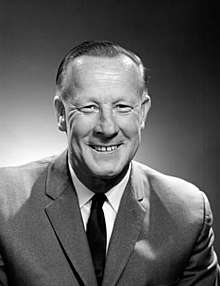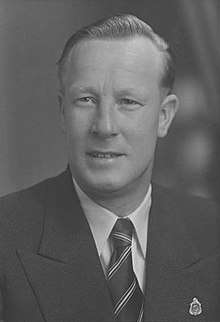Lance Barnard
Lance Herbert Barnard AO (1 May 1919 – 6 August 1997) was an Australian politician and diplomat. He was a member of the House of Representatives from 1954 to 1975, representing the Labor Party, and served as the party's deputy leader from 1967 to 1974. In the Whitlam Government, he was deputy prime minister from 1972 to 1974. After leaving politics he served as Ambassador to Norway, Finland, and Sweden from 1975 to 1978.
Lance Barnard | |
|---|---|
 | |
| Deputy Prime Minister of Australia | |
| In office 5 December 1972 – 12 June 1974 | |
| Prime Minister | Gough Whitlam |
| Preceded by | Doug Anthony |
| Succeeded by | Jim Cairns |
| Minister for Defence | |
| In office 5 December 1972 – 6 June 1975 | |
| Prime Minister | Gough Whitlam |
| Preceded by | David Fairbairn |
| Succeeded by | Bill Morrison |
| Deputy Leader of the Labor Party | |
| In office 9 February 1967 – 12 June 1974 | |
| Leader | Gough Whitlam |
| Preceded by | Gough Whitlam |
| Succeeded by | Jim Cairns |
| Member of the Australian Parliament for Bass | |
| In office 29 May 1954 – 2 June 1975 | |
| Preceded by | Bruce Kekwick |
| Succeeded by | Kevin Newman |
| Personal details | |
| Born | Lance Herbert Barnard 1 May 1919 Launceston, Tasmania, Australia |
| Died | 6 August 1997 (aged 78) Melbourne, Victoria, Australia |
| Political party | Labor |
| Spouse(s) | Doris Burston ( m. 1943)Jill Cant ( m. 1962) |
| Relations | Claude Barnard (father) Michael Barnard (nephew) Eric Barnard (cousin) Harry Cant (father-in-law) |
| Occupation | Schoolteacher |
Early life
Barnard was born in Launceston, Tasmania, one of four children born to Herbert Claude Barnard and the former Martha Melva McKenzie. His father, a trade unionist and locomotive driver, was elected to parliament in 1934, and was a minister in the Chifley Government.[1]
Barnard left school during the Great Depression and worked in a timberyard for a few years. He began training as a schoolteacher by attending night school. In 1940, Barnard enlisted in the Australian Army. He fought with the 9th Division in the Middle East and Africa, including in the Battle of El Alamein. His military service left him with a permanent hearing impairment. After returning to Australia in 1945, Barnard qualified as a schoolteacher and subsequently taught mathematics in various Tasmanian schools.[2]
Political career

At the 1954 federal election, Barnard was elected to the Division of Bass for the Labor Party. He defeated the sitting Liberal member Bruce Kekwick, who had defeated Claude Barnard for the seat in 1949.
In 1967, Barnard became Deputy Leader of the Labor Party and when it won office under Whitlam in 1972 Barnard was Deputy Prime Minister. As Minister for Defence, Barnard personally ensured the recommendations of the Jess Committee and new Defense Force Retirements Benefits Scheme was implemented in 1972.[3]
For the first two weeks of Whitlam's government, before the full electoral result was known, Whitlam and Barnard formed a two-man ministry, known as a duumvirate, to govern until a full ministry could be announced. Barnard held 14 portfolios including Defence and Immigration. Following the announcement of a complete ministry, Barnard served as Minister for Defence.
Following the 1974 election, Barnard lost the Labor Deputy Leadership to Dr. Jim Cairns. He remained Defence Minister until resigning from parliament a year later.
Later years
Whitlam appointed Barnard Ambassador to Norway, Finland, and Sweden in 1975.[4] Bass was resoundingly lost to the Liberals at the ensuing by-election, in which Labor lost 17 per cent of its primary vote. This shock result was seen by many as the beginning of the end for the Whitlam government, which was dismissed five months later.
From 1981 to 1985, Barnard was director of the Office of Australian War Graves.
Personal life
Barnard married Doris Burston on 6 March 1943.[5] They had two daughters together, Patricia and Suzanne. He remarried on 11 September 1962 to Jill Cant, the daughter of Senator Harry Cant of Western Australia. They had a son together, Nicholas,[6] and also adopted two Vietnamese orphan girls, Amanda and Jacqueline; Amanda died as an infant.[7][8]
References
- R. J. K. Chapman, 'Barnard, Herbert Claude (1890–1957)', Australian Dictionary of Biography, National Centre of Biography, Australian National University, http://adb.anu.edu.au/biography/barnard-herbert-claude-9436/text16589, published first in hardcopy 1993, accessed online 30 March 2018.
- Obituary: Lance Barnard
- "Unknown". Canberra Times. 1 November 1972.
- Whitlam, Gough (23 June 1975). "Appointment of Ambassador to Sweden, Finland and Norway" (Press release). Archived from the original on 17 April 2015.
- "An Afternoon Wedding". The Examiner. 8 March 1943.
- "On being a politician's wife". The Canberra Times. 19 August 1969.
- "War Waif Adopted". The Canberra Times. 11 February 1971.
- "A Hug for Jacqueline". The Canberra Times. 31 May 1972.
| Political offices | ||
|---|---|---|
| Preceded by Doug Anthony |
Deputy Prime Minister of Australia 1972–1974 |
Succeeded by Jim Cairns |
| Preceded by David Fairbairn |
Minister for Defence 1972–1975 |
Succeeded by Bill Morrison |
| Preceded by Tom Drake-Brockman |
Minister for Air 1972–1973 |
Abolished |
| Preceded by Bob Katter |
Minister for the Army 1972–1973 | |
| Preceded by Malcolm Mackay |
Minister for the Navy 1972–1973 | |
| Preceded by Victor Garland |
Minister for Supply 1972–1973 |
Succeeded by Kep Enderby |
| Parliament of Australia | ||
| Preceded by Bruce Kekwick |
Member for Bass 1954–1975 |
Succeeded by Kevin Newman |
| Party political offices | ||
| Preceded by Gough Whitlam |
Deputy Leader of the Australian Labor Party 1967–1974 |
Succeeded by Jim Cairns |
| Diplomatic posts | ||
| Preceded by John Petherbridge |
Australian Ambassador to Sweden Australian Ambassador to Norway Australian Ambassador to Finland 1975–1978 |
Succeeded by Brian Hill |